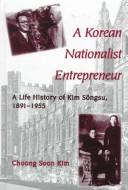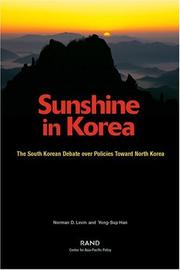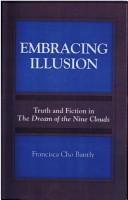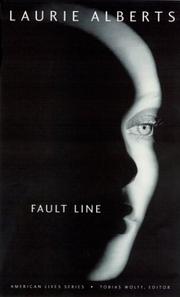| Listing 1 - 10 of 50 | << page >> |
Sort by
|
Book
ISBN: 1945251077 9781945251078 Year: 2016 Publisher: [San Francisco]
Abstract | Keywords | Export | Availability | Bookmark
 Loading...
Loading...Choose an application
- Reference Manager
- EndNote
- RefWorks (Direct export to RefWorks)
Kim, Gene. --- E-books

ISBN: 0585056595 9780585056593 0791437213 0791437221 1438408978 Year: 1998 Publisher: Albany : State University of New York Press,
Abstract | Keywords | Export | Availability | Bookmark
 Loading...
Loading...Choose an application
- Reference Manager
- EndNote
- RefWorks (Direct export to RefWorks)
Statesmen --- Public officers --- Kim, Sŏng-su, --- Kim, Inchʻon, --- Kim, In-chʻon, --- Kim, Sung Soo, --- 金性洙, --- 김성수, --- Korea --- Japan --- History --- Kim, Inch'on, --- Kim, In-ch'on, --- 金 性洙, --- 김 성수,

ISBN: 1282282778 9786612282775 0833033999 0833033212 9780833033994 9781282282773 9780833033215 6612282770 Year: 2002 Publisher: Santa Monica, CA RAND
Abstract | Keywords | Export | Availability | Bookmark
 Loading...
Loading...Choose an application
- Reference Manager
- EndNote
- RefWorks (Direct export to RefWorks)
The debate in South Korea over the government's engagement policy toward North Korea (the so-called 'sunshine? policy) did not start with Pyongyang's recent admission that it has been secretly pursuing a nuclear weapons program in violation of multiple international commitments. However, the evolution of the debate will be an important determinant of how the South Korean and broader international response to this latest North Korean challenge ultimately ends. Examining the public South Korean debate over dealings with North Korea, this book reviews the relevant historical background, focus in
Korean reunification question (1945- ) --- Kim, Dae Jung, --- Korea (South) --- Korea (North) --- Politics and government --- Foreign relations --- Korean unification question (1945- ) --- Reunification of Korea (1945- ) --- Unification of Korea (1945- ) --- Kim, Tae Chung, --- Kim, Tae-jung, --- Kin, Daichū, --- Kim, Dae-jun, --- Kim, Hugwang, --- Kim, Hu-gwang, --- Jin, Dazhong, --- Chin, Ta-chung, --- 金大中, --- 김 대중, --- 김대중, --- Dae, Jung Kim --- Kim, Tae Chung --- Kim, Tae-jung --- Kin, Daichū --- Kim, Dae-jun --- Kim, Hugwang --- Kim, Hu-gwang --- Jin, Dazhong --- Chin, Ta-chung --- 김대중

ISBN: 0585042632 9780585042633 0791429695 0791429709 0791495698 Year: 1996 Publisher: Albany State University of New York Press
Abstract | Keywords | Export | Availability | Bookmark
 Loading...
Loading...Choose an application
- Reference Manager
- EndNote
- RefWorks (Direct export to RefWorks)
Book
ISBN: 1438473745 1438473737 1438473729 9781438473741 9781438473734 Year: 2019 Publisher: Albany
Abstract | Keywords | Export | Availability | Bookmark
 Loading...
Loading...Choose an application
- Reference Manager
- EndNote
- RefWorks (Direct export to RefWorks)
First published in Korean in 2016, Inside North Korea's Theocracy offers a fascinating and rare look at the lives of several of the regime's key leaders. Its primary focus is Jang Song-thaek, a talented and reform-minded member of the political ruling class who was executed in 2013. Jang was the son-in-law of North Korean founder, Kim Il-sung; brother-in-law of its second leader, Kim Jong-il; and uncle to its current leader, Kim Jong-un. The author traces Jang's life from his youth as a brilliant student in Pyongyang to his eventual marriage to Kim Kyong-hui and his rising power as a businessman to, ultimately, his untimely death. In addition to biographical sketches of Jang, his wife, and brother-in-law, Ra Jong-yil provides first-hand impressions of life in North Korea and illuminates the inner workings of its government.
Politicians --- Political persecution --- Political repression --- Repression, Political --- Persecution --- Civil rights --- Statesmen --- History --- Chang, Sŏng-t'aek, --- Kim, Chŏng-il, --- Kim, Kyŏng-hŭi, --- 김 경희, --- Kim, Jong Il, --- Kin, Shōnichi, --- Chin, Cheng-jih, --- Kim, Djeund Il, --- Il, Kim Djeung, --- Ir, Kim Chen, --- Kim, Chen Ir, --- 金正日, --- 金 正日, --- 김 정일, --- 김정일, --- Kaṅʻmʻ, Gyuṃʼī, --- 장 성택, --- 張 成澤, --- Jang, Song-thaek, --- Korea (North) --- Politics and government --- Kim, Jong Il --- Kim Jong Il --- Kim, Djeung Il --- Kim Djeung Il --- Kim, Chŏng-il --- Gim, Jeong-il --- 김, 정일 --- 金, 正日
Book
ISBN: 0231553676 Year: 2020 Publisher: New York : Columbia University Press,
Abstract | Keywords | Export | Availability | Bookmark
 Loading...
Loading...Choose an application
- Reference Manager
- EndNote
- RefWorks (Direct export to RefWorks)
Today, the People’s Republic of China is North Korea’s only ally on the world stage, a tightly knit relationship that goes back decades. Both countries portray their partnership as one of “brotherly affection” based on shared political ideals—an alliance “as tight as lips to teeth”—even though relations have deteriorated in recent years due to China’s ascendance and North Korea’s intransigence.In A Misunderstood Friendship, leading diplomatic historians Zhihua Shen and Yafeng Xia draw on previously untapped primary source materials revealing tensions and rivalries to offer a unique account of the China–North Korea relationship. They unravel the twists and turns in high-level diplomacy between China and North Korea from the late 1940s to the death of Mao Zedong in 1976. Through unprecedented access to Chinese government documents, Soviet and Eastern European archives, and in-depth interviews with former Chinese diplomats and North Korean defectors, Shen and Xia reveal that the tensions that currently plague the alliance between the two countries have been present from the very beginning of the relationship. They significantly revise existing narratives of the Korean War, China’s postwar aid to North Korea, Kim Il-sung’s ideological and strategic thinking, North Korea’s relations with the Soviet Union, and the importance of the Sino-U.S. rapprochement, among other issues. A Misunderstood Friendship adds new depth to our understanding of one of the most secretive and significant relationships of the Cold War, with increasing relevance to international affairs today.
Kim, Il-sŏng, --- Mao, Zedong, --- China --- Foreign relations
Book
Abstract | Keywords | Export | Availability | Bookmark
 Loading...
Loading...Choose an application
- Reference Manager
- EndNote
- RefWorks (Direct export to RefWorks)
Today, the People’s Republic of China is North Korea’s only ally on the world stage, a tightly knit relationship that goes back decades. Both countries portray their partnership as one of “brotherly affection” based on shared political ideals—an alliance “as tight as lips to teeth”—even though relations have deteriorated in recent years due to China’s ascendance and North Korea’s intransigence.In A Misunderstood Friendship, leading diplomatic historians Zhihua Shen and Yafeng Xia draw on previously untapped primary source materials revealing tensions and rivalries to offer a unique account of the China–North Korea relationship. They unravel the twists and turns in high-level diplomacy between China and North Korea from the late 1940s to the death of Mao Zedong in 1976. Through unprecedented access to Chinese government documents, Soviet and Eastern European archives, and in-depth interviews with former Chinese diplomats and North Korean defectors, Shen and Xia reveal that the tensions that currently plague the alliance between the two countries have been present from the very beginning of the relationship. They significantly revise existing narratives of the Korean War, China’s postwar aid to North Korea, Kim Il-sung’s ideological and strategic thinking, North Korea’s relations with the Soviet Union, and the importance of the Sino-U.S. rapprochement, among other issues. A Misunderstood Friendship adds new depth to our understanding of one of the most secretive and significant relationships of the Cold War, with increasing relevance to international affairs today.
Kim, Il-sŏng, --- Mao, Zedong, --- China --- Foreign relations
Book
ISBN: 9780252036699 9780252078415 0252078411 0252036697 9780252093791 0252093798 1283583631 9781283583633 9786613896087 Year: 2012 Publisher: Urbana
Abstract | Keywords | Export | Availability | Bookmark
 Loading...
Loading...Choose an application
- Reference Manager
- EndNote
- RefWorks (Direct export to RefWorks)
This study investigates the controversial motion pictures written and directed by the independent filmmaker Kim Ki-duk, one of the most acclaimed Korean auteurs in the English-speaking world. Propelled by underdog protagonists who can only communicate through shared corporeal pain and extreme violence, Kim's graphic films have been classified by Western audiences as belonging to sensationalist East Asian "extreme" cinema, and Kim has been labelled a "psychopath" and "misogynist" in South Korea. Drawing upon both Korean-language and English-language sources, Hye Seung Chung challenges these misunderstandings, recuperating Kim's oeuvre as a therapeutic, yet brutal cinema of Nietzschean ressentiment (political anger and resentment deriving from subordination and oppression).
K9125.80 --- K9790 --- Korea: Genealogy and biography -- biography -- modern period, postwar period (1945- ) --- Korea: Performing and media arts -- cinema --- Kim, Ki-dŏk, --- Kim, Ki-duk, --- Kim, Ki Dak, --- Gim, Gideok, --- Kim, Kiduk, --- 김 기덕, --- 김기덕, --- 金 基徳, --- Criticism and interpretation. --- Motion picture producers and directors. --- Directors, Motion picture --- Film directors --- Film producers --- Filmmakers --- Motion picture directors --- Moviemakers --- Moving-picture producers and directors --- Producers, Motion picture --- Persons --- Ki-duk, Kim, --- Kim, Ki-dok,

ISBN: 0803203934 9780803203938 0803210655 9780803210653 Year: 2004 Publisher: Lincoln University of Nebraska Press
Abstract | Keywords | Export | Availability | Bookmark
 Loading...
Loading...Choose an application
- Reference Manager
- EndNote
- RefWorks (Direct export to RefWorks)
Novelists, American --- Janik, Kim. --- Alberts, Laurie --- Alberts, Laurie. --- Relations with men.
Book
ISBN: 1760800430 1760800848 9781760800840 9781760800857 1760800856 9781760800437 Year: 2019 Publisher: Crawley, Western Australia
Abstract | Keywords | Export | Availability | Bookmark
 Loading...
Loading...Choose an application
- Reference Manager
- EndNote
- RefWorks (Direct export to RefWorks)
Australian literature --- Aboriginal Australian authors --- History and criticism. --- English literature --- Scott, Kim, --- Criticism and interpretation.
| Listing 1 - 10 of 50 | << page >> |
Sort by
|

 Search
Search Feedback
Feedback About UniCat
About UniCat  Help
Help News
News